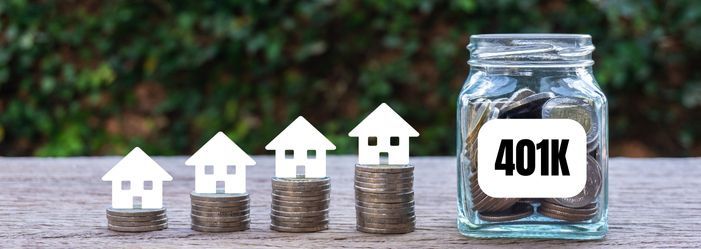Last Updated: March 25, 2024
Retirement Funds for Home Loans?

Disclaimer: We are not qualified legal or tax professionals and are not giving advice. Always speak with a qualified professional before making any legal or financial decisions.
Considering using your 401(k) to manage your mortgage payments? While dipping into your retirement funds might offer a temporary solution to financial hardships or the allure of living mortgage-free, it's crucial to weigh the immediate relief against the long-term implications for your retirement savings.
From tax consequences to the impact on your future financial security, let's explore the pros and cons of utilizing your 401(k) for mortgage payments.
If you'd rather speak to a debt specialist now, click here for a free consultation.
The 401k
The 401k, a retirement plan offered through many employers, is one of the most valuable assets you have. The money that funds the 401k is tax-advantaged. That means that all the money going into your plan is taken out of your paycheck BEFORE taxes.
This means that you pay less in taxes on your take-home pay. This saves you money now. You also do not pay taxes on the earnings on your 401k. Once you retire and start taking out money, you do pay taxes on that 401k money. However, since your tax bracket has dropped, you’ll likely pay less.
The kicker comes if you withdraw money before retirement. You get to pay both taxes and penalties for taking out that money. Before you withdraw money from a 401k, always discuss it with a tax professional, like a CPA!
The 401k Mortgage Dilemma
Your house is probably the single largest physical asset you’ll ever own. Tax professionals report that many people consider using their 401k to pay down their mortgage, especially if they are 59-½, and give themselves more money each month. The answer, for most people, is that it does not make sense to pay the taxes and penalties. However, if you are in this situation, talk to a tax professional.
If you are facing foreclosure, you are in a slightly different situation and may be able to use your 401k to keep your home from being foreclosed. Foreclosure puts a huge hit on your credit report, and it may be years until you recover financially. If you are in this position, here are some things to consider.
Using Your 401k To Pay Off Your Mortgage
Your 401k can be used for financial hardships. If you are still employed by the company and are either 59-1/2 or in financial hardship, you can take out enough money to cover the amount to bring your mortgage current plus the amount for taxes and penalties. The IRS charges 10%, so a $5,000 401k hardship withdrawal will cost you $500, plus taxes.
To use your 401k, you need to fall into specific categories.
- Do you still work for the company where you have your 401k?
- Yes – go to number 2
- No – go to number 3
- Are you facing foreclosure or are you at least 59- ½?
- Yes – You can take out money
- No – You cannot take out money without significant taxes and penalties
- You no longer work for the company or are under 59-½
- Yes – you may take out money but may face taxes and penalties
The often-unrealized penalty for early withdrawal is the decreased earning power that your 401k will have. The money that you withdrew will not be there drawing interest. This may not affect someone early in their career but can financially harm someone at the end of their expected working life.
Another wrinkle to consider is that your 401k is protected from creditors. Your home equity is not 100% protected.
Speak to Pacific Debt Specialists for FREE to hear your options.
An Alternative to Using a 401k to Pay Off a Mortgage
Your 401k may allow you to borrow against 50% of the vested account balance. This option requires you to repay the loan within 5 years. This has some advantages, so talk with a tax professional to make certain you can repay the loan and that the advantages work out in your favor.
What If You Use an IRA To Pay Off Mortgage?
An IRA is another type of retirement account. Like the 401k, it can be used in certain situations. But most tax professionals advise strongly against it. The taxes may eat up most of your withdrawal, the withdrawal may push you into a higher tax bracket, and you may end up owing the IRS money.
Other Potential Funding Sources
Before withdrawing funds from your 401k, first consider if you have any other options to cover urgent mortgage payments, such as:
- Home Equity Line of Credit: A home equity line of credit (HELOC) uses the available equity in your home as collateral for a revolving line of credit. HELOC rates are often lower than credit cards or personal loans. You only pay interest on the amount borrowed. Pros are lower rates and accessible funds, cons are variable rates and putting your home at risk if payments are missed.
- Personal Loans: An unsecured personal loan with a fixed term could provide funds to cover mortgage payments. Rates are often lower than credit cards. Pros are fixed payments and terms while cons are strict approval criteria and repayment schedules.
- Borrowing from Friends/Family: Asking a friend or family member to lend money can provide mortgage relief without interest or strict terms. Be sure to outline repayment plans. A con is putting relationships at risk if disagreements occur.
- Credit Cards: High-interest rate credit cards should only be used sparingly and as a last resort. Pros are quick access to funds but cons like compounding interest can lead to financial risk.
Be sure to consult with a financial advisor to weigh the pros and cons of each choice for your unique situation. Withdrawing 401k funds could lead to long-term repercussions.
Steps to Take Before Withdrawing 401k Funds
Before tapping into your 401k, be sure you have exhausted all other options:
- Forbearance Agreement: Contact your mortgage lender to ask if they offer forbearance agreements that allow temporarily reduced or suspended payments. This prevents fees and damage to your credit report while getting your finances in order.
- Housing Counselor Assistance: A certified housing counselor can review your financial situation and work with you to create a plan to avoid foreclosure. This service is often free through non-profit agencies.
- Consult a Tax Advisor: Speak to a certified financial advisor or tax professional to fully understand the implications of any 401k withdrawal. Ensure you have budgeted for tax penalties and repayment if borrowing against your 401k. Getting personalized advice can prevent costly mistakes.
FAQs
Conclusion
Deciding whether to use your 401k savings to cover mortgage payments or pay off your home loan is a major financial decision. There are pros and cons to consider carefully before moving forward.
The main benefits of using 401k funds can include:
- Gaining immediate access to cash to bring your mortgage current
- Potentially avoiding foreclosure and damaging credit impacts
- Paying off your mortgage to have equity in your home
However, there are also serious drawbacks such as:
- Permanent reduction in retirement savings
- Owing early withdrawal penalties and taxes
- Losing future tax-deferred investment gains
- Entering retirement with less financial security
Before using retirement funds, thoroughly research and understand all alternatives, such as 401k loans. Consulting accredited financial and tax experts is highly recommended when navigating these situations. Acting quickly can help save your home, but exploring every option before withdrawing from your 401k is wise.
This will provide you with the information needed to determine the best path forward for your financial situation. The key is being an informed consumer and knowing professionals are available to guide you through evaluating the pros/cons of each choice. Reach out for assistance to make the most well-rounded decision.
Pacific Debt, Inc.
If you are facing foreclosure and have more than $10,000 in credit card debt, contact Pacific Debt,Inc. We may be able to help you become debt-free in 2 to 4 years. We have settled over $250 million in debt for our customers since 2002.
Pacific Debt, Inc. is accredited with the Consumer Debt Relief Initiative (CDRI) and is an A+ member of the Better Business Bureau. We rate very highly in Top Consumer Reviews, Top Ten Reviews, Consumers Advocate, Consumer Affairs, Trust Pilot, and US News and World Report.
Pacific Debt is currently providing debt relief coverage in the following states:
Alabama, Alaska, Arizona, Arkansas, California, District of Columbia, Florida, Iowa, Idaho, Indiana, Kentucky, Louisiana, Massachusetts, Maryland, Michigan, Missouri, Mississippi, Montana, North Carolina, Nebraska, New Mexico, New York, Oklahoma, Pennsylvania, South Dakota, Texas, Utah, Virginia, Wisconsin
For more information, contact one of our debt specialists today. The initial consultation is free, and our debt experts will give you all your options.
*Disclaimer: Pacific Debt Relief explicitly states that it is not a credit repair organization, and its program does not aim to improve individuals' credit scores. The information provided here is intended solely for educational purposes, aiding consumers in making informed decisions regarding credit and debt matters. The content does not constitute legal or financial advice. Pacific Debt Relief strongly advises individuals to seek the counsel of qualified professionals before undertaking any legal or financial actions.
✔ Accredited by Better Business Bureau with BBB A+ rating (4.93 rating and 1678 reviews)
✔ US News and World Reports and Bankrate ranked Pacific Debt Relief as one of “The Best Debt Relief Companies of 2024”
✔ 6.9 star rating by BestCompany.com (over 2379 client reviews)
✔ 4.8 star rating by TrustPilot based (over 1613 verified consumer reviews)
✔ ConsumerAffairs.com Accredited (over 544 verified reviews with an average rating of 5 stars)
✔ A Top 10 Rated Compan by TopTenReviews.com , ConsumersAdvocate.com and Top10debtconsolidation.com
✔ 4.6 star rating by Google (229 client reviews)
✔ 100% rating by SuperMoney (9 client reviews)
Reduce Your Credit Card Debt By Up to Half

BBB Reviews | 4.9/5.0 Rating









 Do Not Sell My Personal Information
Do Not Sell My Personal Information